The Tawhid Blog
Read, Learn & Grow, One Step at a Time
By Anzal Rafique - Est. Read Time: 3-4 mins
The Significance of Meaningful Dua: A Personal Connection with Allah.
Explore the heartwarming world of 'Dua' in Islam with us. Dua, meaning asking or calling out, is like having a personal chat with Allah. It's more than just words; it's a genuine conversation where you can share your thoughts, feelings, and needs directly with the Most Merciful. Discover how Dua is a special way to connect with Allah, providing peace of mind and a sense of closeness. Join us in embracing the beauty of Dua – a direct line to the One who understands you best.
Dua brings peace and calmness that creates an extremely personal bond with Allah Subhana Watala. But what does it mean to make a meaningful Dua, and how can it connect us to our creator? Let’s dive into an in-depth understanding of Duas and their significance and explore the layers of these powerful prayers from an Islamic and psychological perspective.
Salam Alaykum!
Let’s delve into the essence of “Dua,” a solemn and meaningful practice in Islam. Dua, an Arabic term, translates to calling out, asking, or beseeching for something. In the Islamic faith, it represents a sacred conversation between the Creator and His creation, a moment where we lay bare our hearts before Allah.
Consider Dua as a private dialogue etched in sincerity and reverence. It’s not bound by scripts or designated times; rather, it’s a genuine plea to the Most Merciful, a heartfelt expression of oneself in complete authenticity.
In the realm of personal reflection, treat your conversation with Allah as you would a cherished journal. Cry out to the One who listens unfailingly, regardless of the significance or perceived impossibility of your entreaty. “Your Lord says, ‘Call on Me, and I will answer you;’” (40:60) emphasizes the readiness of Allah to respond to our supplications.
Duas transcend the confines of memorized Arabic verses or specific methods. They embody personal thoughts, desires, and concerns shared with the All-Hearing and the All-Knowing. It serves as a pathway to seek guidance from the Almighty in various facets of life. Unlike structured rituals, Dua isn’t confined to specific moments; Muslims are encouraged to engage in it at any juncture, be it in moments of joy, adversity, or contemplation.
This direct form of communication is intimate and personal, allowing individuals to express their troubles, thoughts, feelings, and needs directly to Allah. Confession becomes a means of relief, fostering consciousness and peace of mind while alleviating burdens and silencing unwarranted voices.
Meaningful Dua surpasses material requests; it serves as a conduit for spiritual guidance, facilitating the transformation of hearts and the revelation of one’s inner self. Humility surfaces in seeking Allah’s help, particularly in matters deemed embarrassing or intensely personal, cultivating an intimate relationship with Him.
In Surah Baqarah, Allah assures proximity and responsiveness to every prayer, emphasizing His nearness and the significance of responding with obedience and belief (2:186).
Dua, the sacred thread that binds the connection between Creator and creation, stands as an intimate and profound dialogue—a bridge of trust and a source of spiritual empowerment. As you raise your hands in prayer, remember that Dua is more than mere words; it is a direct line to the One who understands you better than you know yourself. Embrace the beauty of Dua, for within it lies a connection that transcends the ordinary—a connection with the Most Merciful, Allah. It encapsulates trust, submission, and continual communication, embodying the complete nature of Islam as a way of life.


